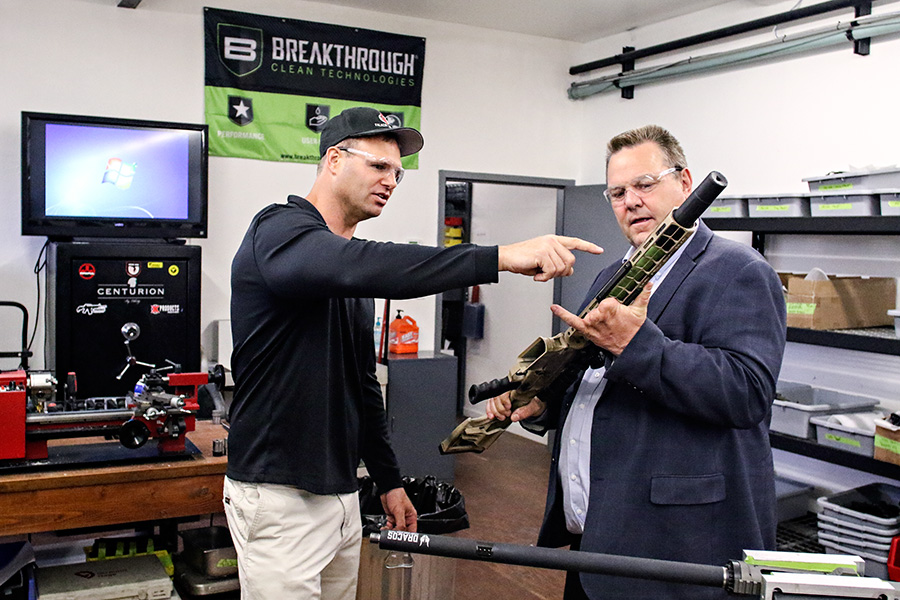Firearms Industry Sees Slight Decline
With decreasing gun sales under Trump administration and impending dealer merger, Montana senators push for initiative to open up international markets
By Molly Priddy
The workshop at Sonju Industrial north of Kalispell is huge, with machines and employees crafting the foundations of world-class firearms.
The air smells of hot metal, the heavy scent catching the back of your throat as you reach the center of the shop, and there’s a constant whir of advanced machinery. A hanging American flag oversees the production, much of it for the FALKOR Defense firearms that are made here.
Montana U.S. Sen. Jon Tester stopped by for a visit last week. Firearms have been part of the Democrat’s recent Congressional agenda, as well as Republican U.S. Sen. Steve Daines’ agenda. Both senators signed a letter to Secretary of State Rex Tillerson and Secretary of Commerce Wilbur Ross, asking the administration to complete the Export Control Reform Initiative, which Tester and Daines say would cut the red tape for Montana’s firearm manufacturers and allow them to sell their products internationally.
“Our state is home to world-class firearm and ammunition manufacturers,” the senators wrote in the letter. “With streamlined regulations, these important businesses will be able to access new markets, create new jobs, and hire hard-working Montanans.”
The initiative in question was launched in 2009 in an attempt to overhaul the nation’s munitions exports, including the control system and regulations. If it’s completed, it will provide guidelines for 21 categories governing firearm and munitions exports.
“It should’ve been done years ago,” Tester told Jason Sonju, president of FALKOR Defense, during the senator’s visit. “This is about … letting the agencies know you’re watching them, that we expect this to be sooner rather than later.”
Firearms manufacturing has taken on considerable importance in the Flathead Valley. During the recession, it was one area of the economy that held steady and even grew. Worries of increased gun control under the Obama administration also helped boost gun sales, and local manufacturers were slammed with orders.
Kelly Streiff, director of sales at Proof Research in Columbia Falls, said the Obama era was a boon for the gun industry, spawning many new businesses. But now that President Donald Trump’s Republican administration is in the White House, that boom has likely plateaued, she said.
Another factor affecting the gun industry is the impending merger between Bass Pro Shops and Cabela’s, a $5 billion deal that will likely be completed later this summer. The merger of the two major gun dealers has hit nearly every manufacturer’s bottom line, Streiff said.
“They are cutting back purchase orders,” Streiff said. “That’s affecting everybody’s business right now.”
Streiff didn’t include Proof in that statement. The company is still young enough that it wasn’t affected by the recent boom-and-plateau cycle because it’s not producing anything in bulk.
“Here, we’re not trying to build 5,000 barrels a week and just throw them out to the masses,” Streiff said. “It’s all about precision. Everything is hand-inspected.”
Sonju said he’s noticed a small decline in purchases at FALKOR, but people still want the products. But if the downturn continues, international sales like those Tester and Daines are pushing for would help make up some of that ground, he said.
“Tester and I go a long way back,” Sonju said. “We understand business. It’s nice to see for once different ideologies rolling up their sleeves and getting to work.”
Sonju said there’s interest in his products in the Middle East and Europe, but he won’t think about those markets until his domestic orders are filled. Otherwise, online accessories sales have been taking off, he said.
Proof would benefit from the finalization of the Export Control Reform Initiative, because it would make doing business, even just across the northern border in Canada, “so much easier,” Streiff said.